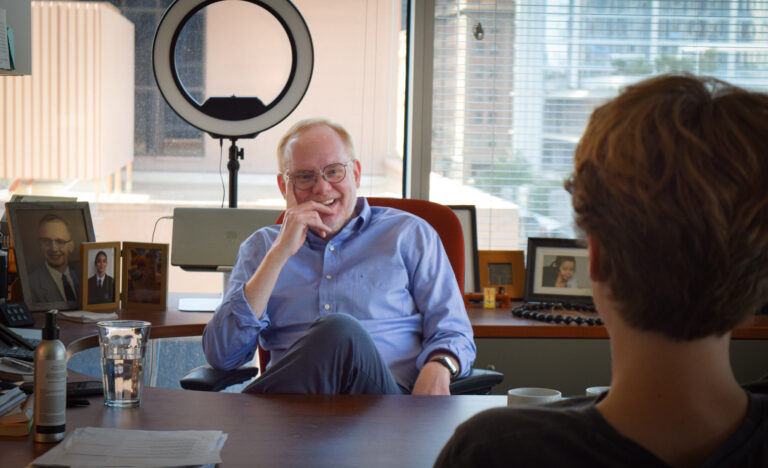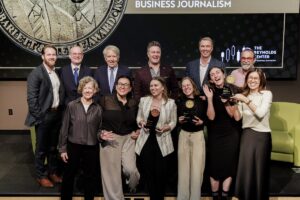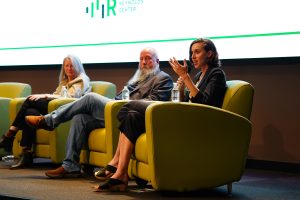Dr. Jeffrey Timmermans grew up in New York City as an avid reader of his hometown newspapers. In particular, he looked forward to feeling the rough newspaper of the iconic Wall Street Journal and hearing the paper wrinkle as he flipped through stories from London to Tokyo. These quirky and interesting stories, with even more interesting writers like Barry Newman, hooked him on journalism as a career from a young age. He never imagined that years later he would work at the paper he loved so much.
Timmermans went on to have more than two decades of experience as a financial journalist and journalism educator.
Timmermans attended Colgate University to earn his bachelor’s degree with honors in Asian Studies. While studying Japanese language and literature, he found a lifelong mentor in his Japanese professor. The two became so close that the professor even let him borrow his car when Timmermans’ car broke down.
“At 20, he told me that I should be a teacher, that I should get my Ph.D. and teach, and it would take me 20 years to finally follow his advice,” said Timmermans. “So, I remember sending him my dissertation and dedicating it to him.”
Timmermans explains that he learned so much from his mentor – he taught him how to be a teacher, mentor, and coach.
“I try to emulate him in my role as well because he taught me how to be a teacher but he taught what it means to be a real mentor and a coach, ” said Timmermans. “My entire teaching philosophy is from him.”
Through Timmermans’ experience, he has learned exactly what these roles mean and what it entails to fulfill these roles successfully.
“You have to care about people and see what talent is in them and help them make full use of it,” said Timmermans. “Everybody’s different, so you have to use your empathy to understand what makes someone tick and help them make the most of themselves.”
Timmermans went on to obtain his Master’s in Journalism at Columbia University and then his Ph.D. at the University of Hong Kong, but his career really started before then when he decided to teach English in Japan, after graduating from Colgate. It was there that he found his first journalistic job.
Learning the ropes in Japan
Timmermans’ journalism career started in Japan in 1991, where he helped produce a monthly Japanese-language newspaper. Timmermans explained that for his first real job, it was quite wacky but that is how he learned to speak and write in proper Japanese.
“It was short, but just a wild experience. We’d start every day by standing up and reciting the company’s slogan together,” said Timmermans.
Timmermans soon went on to intern for The Wall Street Journal in Tokyo.
“That year I was in Tokyo with the Journal, it was very hard and super competitive,” said Timmermans. “It was totally different from what I thought it would be.”
Timmermans explained that since he was low on the totem pole of the hierarchy, he had to fight to prove himself within the newsroom. Timmermans said he remembered the first short feature he did and how he was standing over the editor’s shoulder and watching him read his work. He was nervous for the feedback, but his editor turned to him with a shocked look on his face and said, “You can actually write!” It was both a rewarding and nerve-wracking experience for Timmermans.
While leaving that experience was bittersweet for Timmermans, his next job at the Dow Jones Newswires was an environment that suited his personality more, and he absolutely loved it.
“I loved being right there where the news happened, the prime minister called a press conference at 10 p.m., and you get called and go down there,” said Timmermans.
Timmermans explained that he would feel a rush of excitement being in a fast-paced, heavy news environment and was able to experience things that he necessarily would not have experienced in other types of newsrooms. He advocates for every journalist to work for a newswire at least once within their career to get that experience and feel the same rush he did.
After serving as a Tokyo Correspondent, Timmermans went on to become the Hong Kong Bureau Chief for Dow Jones Newswires and a Managing Editor for the Newswires based in Singapore.
It was in that last role that Timmermans discovered his love of teaching and mentoring reporters that led him to a dramatic career shift. After a year working for global strategy consulting firm Bain & Co., Timmermans decided to finally follow his mentor’s advice.
Shaping business journalism’s future
After earning his Ph.D. from the University of Hong Kong in 2016, Timmermans served for over 10 years as the director of the University of Hong Kong’s undergraduate journalism program. While there, he developed a comprehensive postgraduate business-journalism curriculum widely considered the best in Asia and taught news reporting and economics to undergraduates.
Timmermans explained that the transition from journalism to education was smooth since he had developed skills as an editor that overlapped with being a professor.
“I think a good teacher is just a good editor, they’re a good coach who’s not saying, do this, do that, but helping to bring out the best in each individual writer,” said Timmermans.
This mindset and approach to teaching is the core of his teaching philosophy. He has learned how to bring the best out of people and how to work with them through his experience as an editor and managing reporters.
He transferred his skills and knowledge to the Walter Cronkite School of Journalism and Mass Communication as a Donald W. Reynolds Endowed Chair Professor and the Director of the Reynolds Center for Business Journalism.
Reimagining the Reynolds Center
The Reynolds Center for Business Journalism has a long history of training business journalists and advocating for best practices within the industry. Since Timmermans took over the Center in 2021, he has expanded on that history and refocused the Center’s efforts on training students and young journalists. This new focus helps to advocate for more young and diverse reporters to develop an interest in business journalism and acknowledges the opportunities and importance that come with business coverage and its communities.
“We try to help students understand, as well as the general population, that business journalism affects everything we do. It’s everywhere, and almost every story has a business angle,” said Timmermans.
The Center practices student involvement in its management by adding two to four undergraduate and graduate students to its team at any given time. This could include working on content for the Center’s website or managing award programs such as the Barlett and Steele Awards. The students’ interests and passions directly inform the Center’s work and mission, and this is shown in the work produced through the Center.
Whether it be through podcast episodes such as “We Mean Business,” which focuses on informing and investigating trending topics, providing tools to journalists within the business journalism industry, or exploring the connection between business and pop culture, the students offer a new and fresh perspective that encourages the Center’s continuous advancement.
As for the future of the Center, Timmermans hopes that as the Center expands and grows that it will continue to be a space for people to learn. The Center will continue to adapt and evolve with the journalism industry, especially in regard to the new technology and tools out in the world.
“We’re certainly excited and a little bit fearful about what’s going on with artificial intelligence. But you know, we want to figure out how we can incorporate AI tools in a very effective and productive way into our work,” said Timmermans.
Timmermans has made an impact both in the newsroom and in the classroom on the future of journalism. He has shown the journalism world the great opportunities that come with seizing an opportunity when it comes around, and he advocates for future journalists to do the same.
“I think that’s what young journalists have to be aware of, and just to take advantage of opportunities whenever and wherever they come up. That is one of the key learning points for my career,” said Timmermans.











